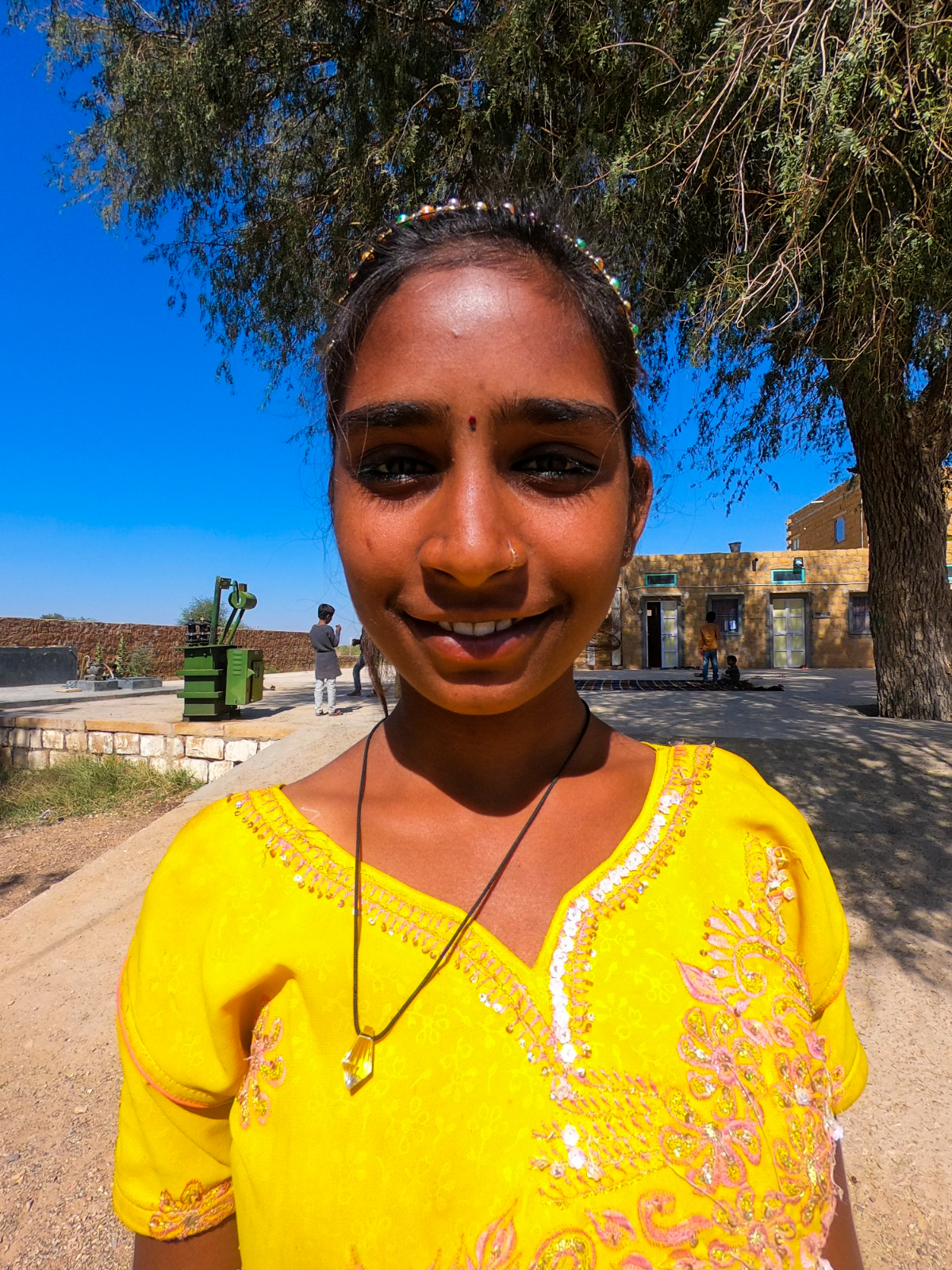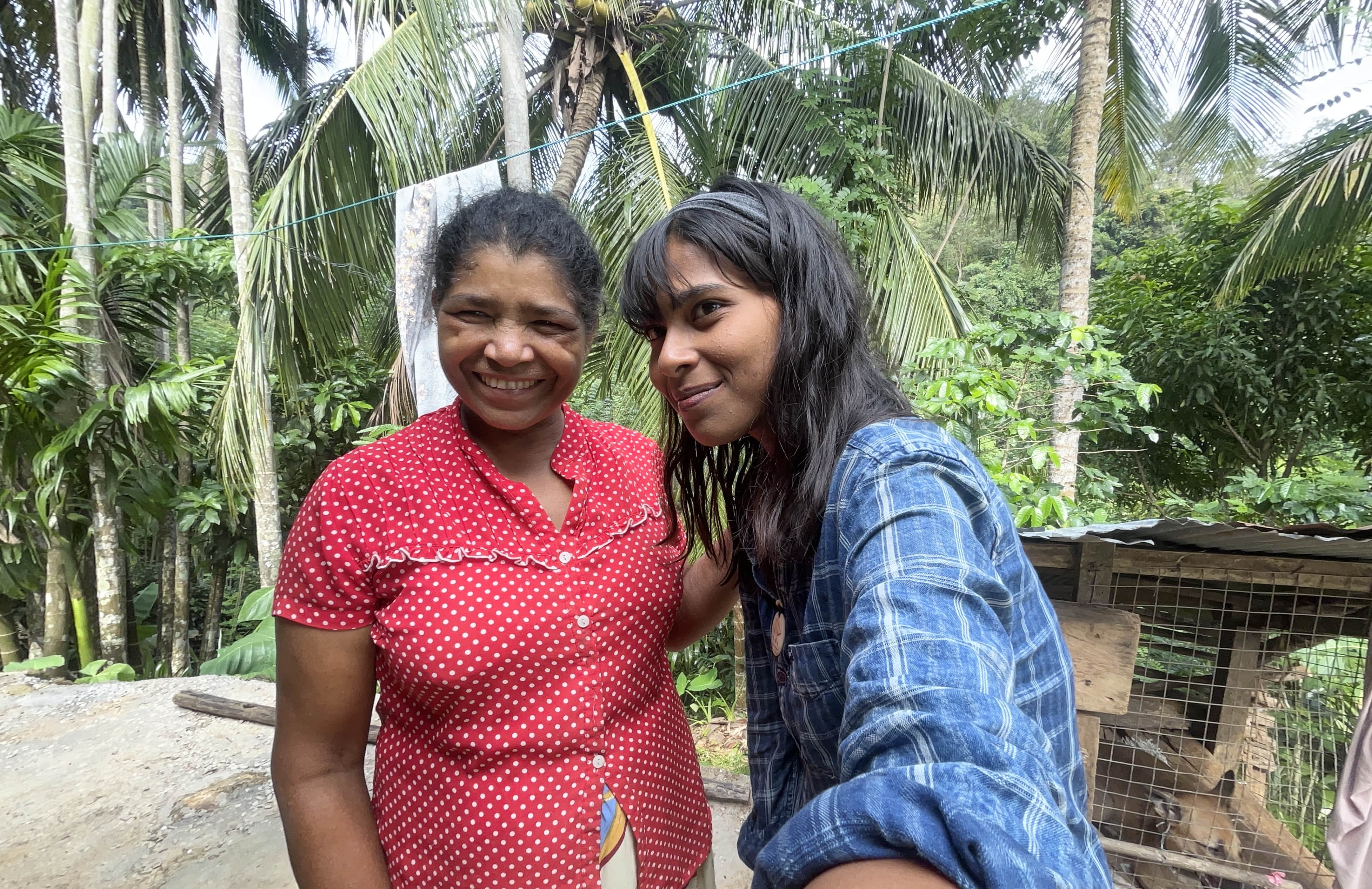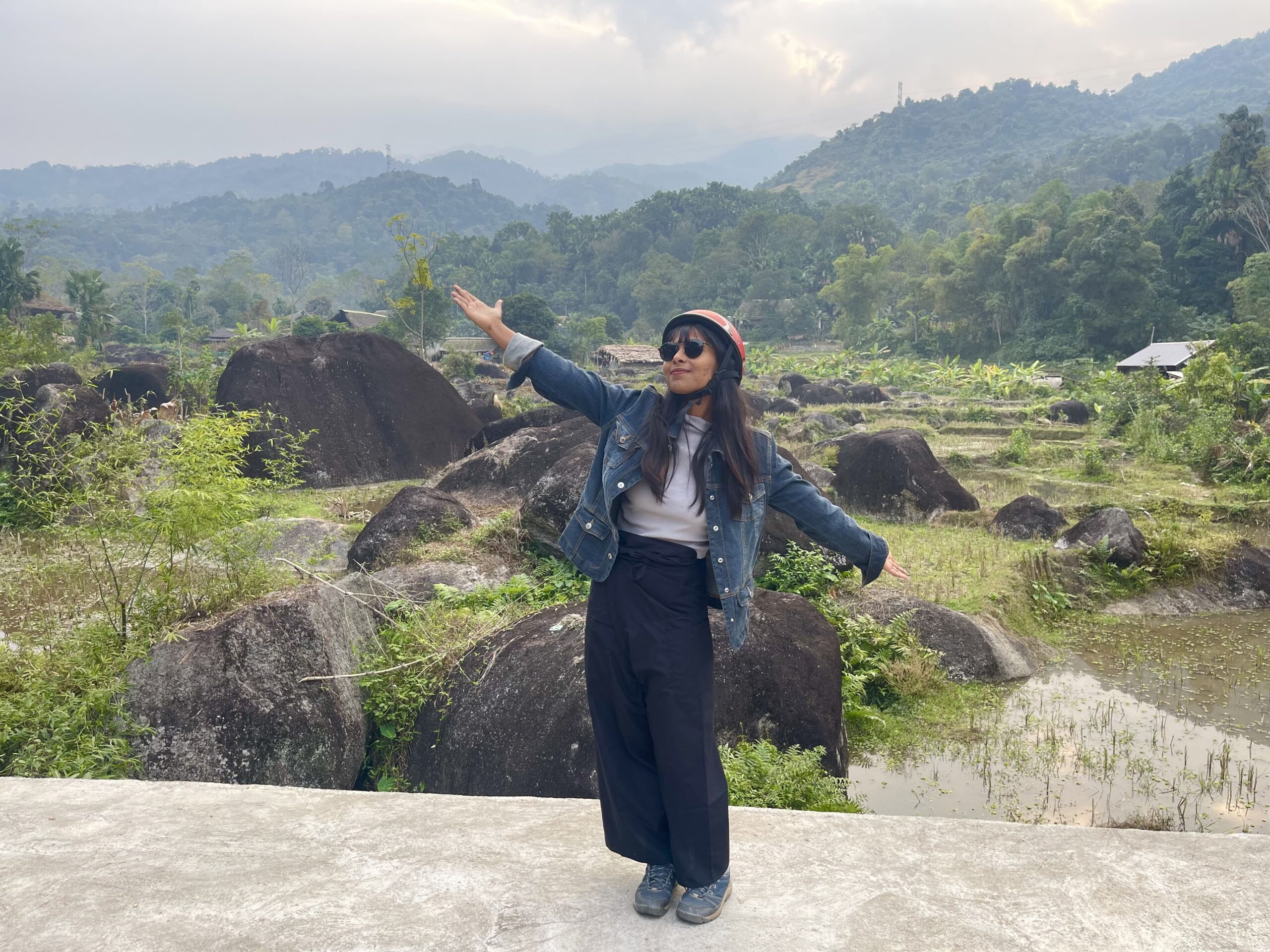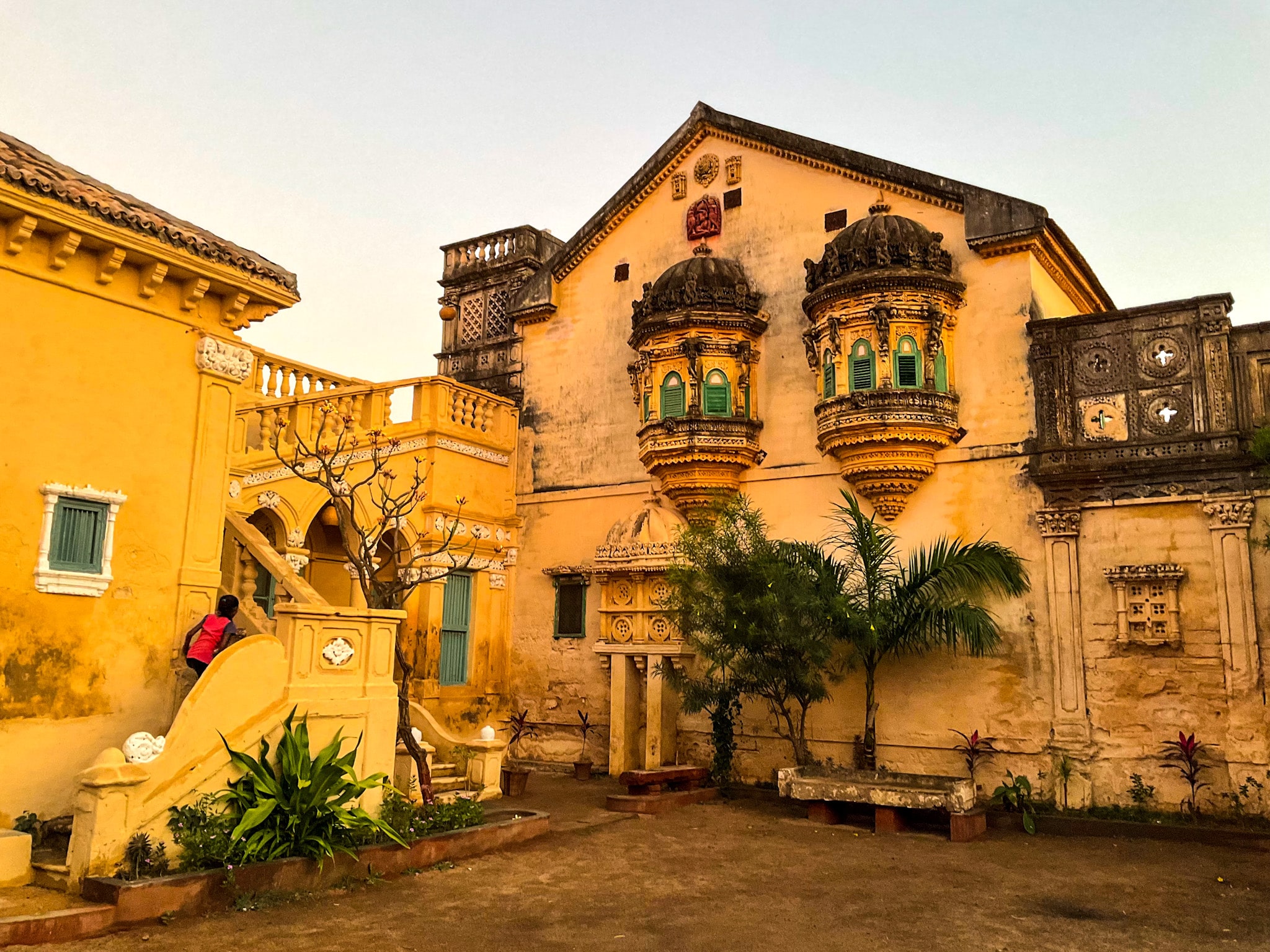Child Marriage? In the 21st Century? You may wonder. Yet it is the truth of Rajasthan in India. The yellow landscape, heritage forts, and other societal norms.
She is fifteen. She is fourteen. She is nine.
She buries herself deeply when in a casual flow of conversation someone happens to mention ‘marriage’. Like a strong current, she establishes herself on her dreams that will rob her of the long-awaited guillotine of marriage, or the end of a life. That’s Nirma.

She is jovial, full of pure life, and recently got frizzles on her forehead. She is still a child, but always tells me how much she hates marriage. That’s Divya.
Her kohled-eyes, Marwari accent, and intimate hugs every day bring warmth and a breath of fresh air. She is not fluent in reading English, but never shies away from trying. That’s Luni.
She is Yamuna. The shortest and the sweetest of all.
Meena, Haru, and Lilou. I have met them only a couple of times. They are now in a different school, having passed out from Darbari School after the 8th standard. Lilou has always liked the army and has been pestering her parents for a path of Force.
Child Marriage? In the 21st Century?
The girls have become women, without hitting 18, through the right education in proportion. Every time I talk to them, I see women in them. Hardened in the reality of customs, being always sandwiched in a fate that they don’t get to choose, I think they understand their womanhood better than their counterparts.

The same fate awaits the boys. There’s no freedom of choice. A girl is married off at the age of 9-10 and a boy, at 14-15. They tie the living-knot once they hit adulthood, but they don’t get to choose otherwise.
Educating a girl child is an uncommon affair, hard to come by in the yellow-sandstone-laden picturesque streets of Jaisalmer, and more prominently in the rural setting. There’s hardly any local woman on the street, and the girls’ worth is still calculated on the parameter of how many matkas (earthen pots) she can carry over her head.
There’s only one particular gali (narrow street) with beauty parlours run by women, from the interior of their homes. Even if a parent is ‘kind’ enough to enroll her girl-child in a school, her journey would end by the end of the 8th standard!
Women are destined to get married, have ten-eleven children within the tradition of their veils, and live with unloving husbands who look for sex in tourists. Jaisalmer’s economy is highly driven by tourism, so is the sexual repression expressed in odd terms!
Meena, a soon-to-be adult girl expressed her sorrow, “They just want us to focus on the traditions. I would only pray such traditions end soon and every girl gets the freedom to live her life.”

Among all this, Nisha gives me hope. Her family, coming from a slum area, advocates her education. Her thirst to learn languages makes me sit with her privately during the school recess, to teach Bengali. And she has picked up so fast!
“The life of a Rajasthani daughter is very difficult. After marriage, she goes to a house she has never seen and goes to a family she doesn’t recognise at all. She is denied education. The people here, except the girl, don’t understand her feelings.” Meena, a soon-to-be adult girl expressed her sorrow, “They just want us to focus on the traditions. I would only pray such traditions end soon and every girl gets the freedom to live her life.”
And I told her, “You are that strong force.”
Also read – Locals Conserving Camels near Jaisalmer Rajasthan
Sustainable Learning and How It Can Change the Narrative

Among the chaos of this burdensome traditional flow, Darbari Waldorf School in Darbari village, 10 km away from Jaisalmer, is rearing these girls, with sustainable learning and unprecedented nourishment. Volunteering for a month in the school and later on visiting Nisha’s slum made me understand the parents who, as a matter of fact, are willing to send their girl-children to school, however small the number be.
The inhabitants of Darbari primarily belong to the Bhil tribe of India, the ‘untouchables’. The foundation of this Adivasi ethnic group is endogamy, so are most of the clans and sub-clans in Rajasthan.
Followed by a romantic relationship between a Frenchwoman and an Indian camel driver, the school started getting a faint shape in Pabu Ki Dani. Later on, the Frenchwoman asked her former class teacher Jacques Monteaux to carry the beacon forward.
Jacques, now 70 years of age, had come to India years back as a backpacker, and the educational poverty of Jaisalmer had moved him to the depth that he decided to come back only when he could do something about it. In 2013, his connection with Ganpat’s family began to flow, and now in 2022, the nine-student classroom has flourished into a sustainable learning family.
Also read – Travel Meaningfully with These Volunteering Opportunities in India
What is Sustainable Learning?

I have volunteered for more than three-four years all over India (and later on internationally), and this is where for the first time I could see sustainable learning being implemented.
Every morning the car would come to pick us up from Jaisalmer. I was living in a hostel Wonbin Safari, my second stretch of part-time volunteering. The other teachers, Helene, Formi, and Jacques lived in Ganpat’s hotel. Jacques used to live with the local family in the village, but later on, moved to Jaisalmer.
Ganpat is the youngest teacher in Darbari, taking up the responsibilities of his own village at the age of 20. He wanted to be a pilot, but life courses and choices could not resonate much with his dream of flying. But he is glad it didn’t.
They couldn’t care for a straight line, ironed school uniform, or the Indian school-tradition of not-letting-one-strand-of-hair coming out of neatly-tied ponytails or braids. No, no straight line. And definitely no means of violence. An effective Indian method of teaching is often beating the shit out of the students, seldom proposed by the parents themselves (because that’s their method too).

‘They are happy children’, Helene, the French teacher would smile with the daily goodbyes ‘A demain’ (‘See you tomorrow’). And they are happy. ‘I wasn’t learning anything in the previous school, because I was slow and I was always scared of the teachers. Now I am learning so fast! I never thought I would!’, this is a ten-year-old kid speaking his heart to me.
How? They don’t even have any ‘syllabus’!
Sustainable learning is how you sustain what you learn and sustain your life through the process of learning. When the morning prayer brings joy and positivity, your day creates itself.
We would sing and dance during the prayers, attuned to Jacques’ nimble guitar tunes. We would sing songs in Marwari (the local language), Hindi, English, French… and dance in a circle. The kids would colour the papers, play around with interlocked games, make sand dunes, or do whatever they wanted to. Jacques likes to call it ‘self-expression’.
Also read – 15 Best Places to Visit in Jaipur for A Pink Getaway
What’s Not In the Textbooks?
How do you learn to count 1 to 100 in French? You play ludo. How do you learn to count 1 to 20 in English? You throw the ball. How do you know the alphabet? You have an ABCD Race!
You want to learn the colours? Origami! You learn the colours, you learn how to craft papers, and you get to learn patience and precision.
Is it really that simple? Yes!
Educating a girl child is an uncommon affair, hard to come by in the yellow-sandstone-laden picturesque streets of Jaisalmer, and more prominently in the rural setting. There’s hardly any local woman on the street, and the girls’ worth is still calculated on the parameter of how many matkas (earthen pots) she can carry over her head.
The Man Who Changed the Definition of ‘Change’

Funny thing, a partially-free school in the remote corner of Rajasthan is providing the kind of education the commercial three-lakhs-fee schools in modern cities are not capable of providing, by default. Education, the commodity, can surely be compounded in the marketplace. But when could anyone ever calculate the joy of learning?
The donations for the school come from overseas, with no help from India whatsoever. Jacques used to wait for months for the money to arrive so that he could put the first bricks together. It was a corridor of patience.
He wasn’t just building a school, he was building relationships. Without relationships, there never was anything really.
Jacques is an author, illustrator, photographer, and by profession, at this juncture, a teacher trainer. At a glance, he is a round-spectacled professor with a white beard and blue eyes. He is a creator, the maker. A man the world doesn’t know about.
The man who is changing the course of lives. And that’s a man I admire.
Connect with the School

You may choose to volunteer or donate to the most promising stream of development. Change the landscape! You can connect with them here (Updated in 2023: The Darbari Waldorf School has been closed since July 7, 2022, but they are following their former students in their education, as per their website).
Jacques Monteaux brought back the wick of established change; the kind of change I stopped believing in along the long way. Change is real, and sustainable.
What does Sustainable Learning mean to you?
Support my solo adventures across the globe by joining the Patreon community!
Live the Adventure
Get weekly articles delivered to your doorstep and stay up-to-date with my new travel stories.
3 responses to “Girls Get Married at the Age of Nine in Rajasthan”
-
Sometimes I struggle to imagine how different parts of the world work when it comes to marrying kids off and things. Really interesting insight x
-
This is heartbreaking but it is also very hopeful. As you said, education is key, education and raising awareness that this is not ok!
-
I think it’s absolutely heartbreaking that in parts of the world girls and women are so mistreated still to this day. These girls have their innocence taken from them too soon and the boys too. It’s no way to grow up. Thank you for bringing attention to this really important issue that needs to be rejected on all platforms in order to ensure a future of equality for everyone.





Leave a Reply